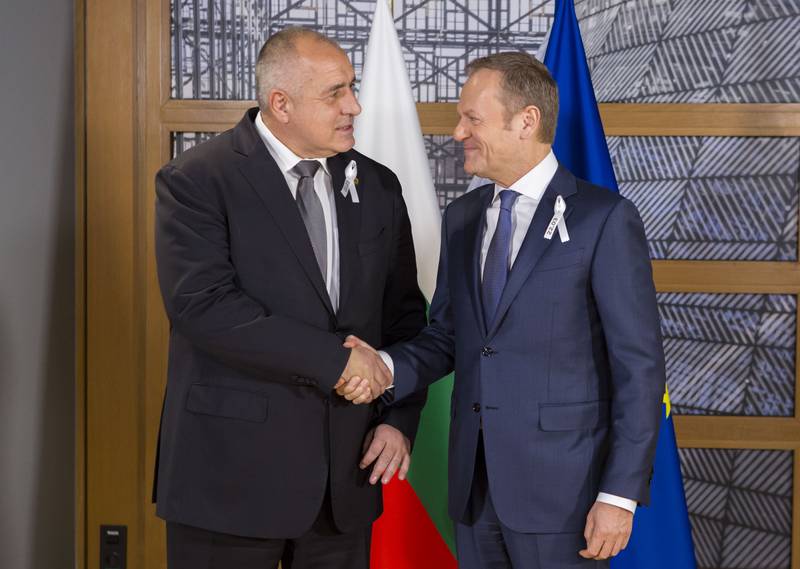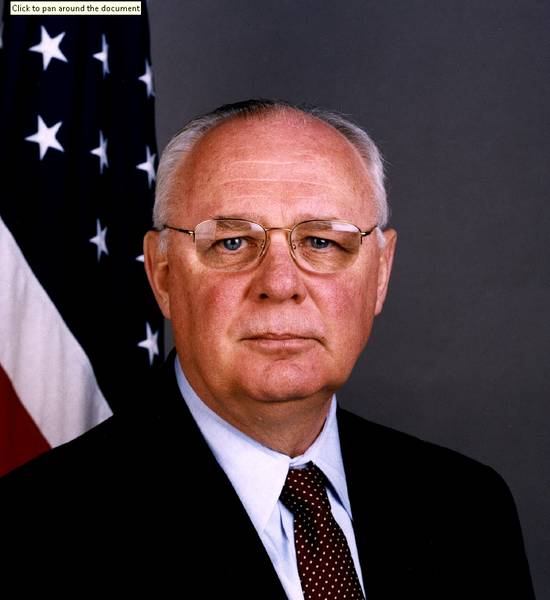The Russian Bear at the European Doorstep
Ralitsa Kovacheva, February 6, 2012
 For the European Union, Russia is the elephant in the room - something that everyone is seeing but nobody wants to discuss. Russia is the bear on EU's doorstep but what we say in our official statements does not reflect our real attitude towards it.
For the European Union, Russia is the elephant in the room - something that everyone is seeing but nobody wants to discuss. Russia is the bear on EU's doorstep but what we say in our official statements does not reflect our real attitude towards it.
These words belong to British MEP Edward McMillan-Scott (ALDE), and the occasion for this revelation was debate on the situation in Russia, which took place in the European Parliament late on 1 February. The EU High Representative for Foreign Affairs and Security Policy Catherine Ashton also took part in the debates. It was quite expected MEPs to express sharp criticism of Moscow, moreover given that most of the speakers were representatives of the former Soviet republics or satellites.
Polish EPP MEP Pawel Zalewski said that the EU policy of democratisation in  Russia had failed and it must seek new, more realistic policy toward Russia. According to Ms Kristiina Ojuland (ALDE, Estonia) Vladimir Putin's efforts to retain power would jeopardise the partnership between Russia and the EU. "We are worried that the regime will not meet our expectations," she noted. Inese Vaidere MEP (EPP, Latvia) recalled that Russia was interfering in the internal affairs of EU countries, citing the example of Russia's insistence the Russian language to become official in Latvia.
Russia had failed and it must seek new, more realistic policy toward Russia. According to Ms Kristiina Ojuland (ALDE, Estonia) Vladimir Putin's efforts to retain power would jeopardise the partnership between Russia and the EU. "We are worried that the regime will not meet our expectations," she noted. Inese Vaidere MEP (EPP, Latvia) recalled that Russia was interfering in the internal affairs of EU countries, citing the example of Russia's insistence the Russian language to become official in Latvia.
Most MEPs criticised Moscow's foreign policy, especially its refusal to support the UN Security Council resolution on Syria. But most criticisms were directed mostly against the domestic political decisions of Russian rulers - in terms of disregard for the civil rights, pressure on the media and concerns that the result of the presidential elections on 4 March has been decided in advance.
 Lawmakers sharply criticised the refusal to register for the election Grigory Yavlinski, founder of the Yabloko liberal party. Yabloko is a member of the Party of European Liberals and Democrats, so it is understandable that the ALDE group was particularly active on this issue. Graham Watson, MEP from ALDE, called on Baroness Ashton, if there would be an extension of sanctions against individuals from the Russian regime, the secretary of the Russian Central Election Commission Nikolai Konkin to be also included. Currently Yabloko is under investigation by the Moscow Prosecutor's Office, which has been interested in the location of the party’s website server, the MEP said. Ms Ashton, in turn, expressed the view that Mr Konkin should go to the State Duma to explain his decision.
Lawmakers sharply criticised the refusal to register for the election Grigory Yavlinski, founder of the Yabloko liberal party. Yabloko is a member of the Party of European Liberals and Democrats, so it is understandable that the ALDE group was particularly active on this issue. Graham Watson, MEP from ALDE, called on Baroness Ashton, if there would be an extension of sanctions against individuals from the Russian regime, the secretary of the Russian Central Election Commission Nikolai Konkin to be also included. Currently Yabloko is under investigation by the Moscow Prosecutor's Office, which has been interested in the location of the party’s website server, the MEP said. Ms Ashton, in turn, expressed the view that Mr Konkin should go to the State Duma to explain his decision.
The statement of Slovak socialist MEP Monika Flašíková Beňová provoked  heated passions, as she said that before criticising corruption in Russia, the EU should criticise corruption in its own countries. "When we say that in Russia the opposition is unable to respond, let's ask what are the possibilities of the opposition in Romania, which is a EU member. If we say that a strong party dominates the state, let's look at what's happening in Hungary." After objections, that the comparison was unacceptable, she explained that she did not want to compare any country with Russia but just to call for a constructive criticism on Moscow.
heated passions, as she said that before criticising corruption in Russia, the EU should criticise corruption in its own countries. "When we say that in Russia the opposition is unable to respond, let's ask what are the possibilities of the opposition in Romania, which is a EU member. If we say that a strong party dominates the state, let's look at what's happening in Hungary." After objections, that the comparison was unacceptable, she explained that she did not want to compare any country with Russia but just to call for a constructive criticism on Moscow.
Some MEPs compared the protests in Moscow late last year with the Arab spring, while others opposed, saying that the Russian protests would not radicalise as much as those in Egypt, because they were organised by the middle class. But the general opinion was that the European Union should support the Russian civil society in its struggle for freedom and democracy.
 "The best way forward is to engage in dialogue with the protesters and the opposition, and together define an agenda of change," the EU High Representative Catherine Ashton told MEPs. In Russia there are more and more people who want a truly democratic process, effective participation in the governance, decisive action against corruption and impunity and are willing to express their views peacefully, Baroness Ashton noted. "The 'tandem’s' [Vladimir Putin and Dmitry Medvedev] announcement in September that they would swap jobs again between President and Prime Minister made many Russian citizens feel that things were being decided between only two men, over the heads of voters."
"The best way forward is to engage in dialogue with the protesters and the opposition, and together define an agenda of change," the EU High Representative Catherine Ashton told MEPs. In Russia there are more and more people who want a truly democratic process, effective participation in the governance, decisive action against corruption and impunity and are willing to express their views peacefully, Baroness Ashton noted. "The 'tandem’s' [Vladimir Putin and Dmitry Medvedev] announcement in September that they would swap jobs again between President and Prime Minister made many Russian citizens feel that things were being decided between only two men, over the heads of voters."
Ms Ashton called on the Russian authorities to urgently reconsider its decision not to register Grigory Yavlinski for the elections and do their best to ensure fair and honest elections because "this time, expectations will be higher".
As to the differences between Moscow and Brussels regarding Syria, Baroness Ashton urged Russia to join the international consensus and to allow the UN Security Council to act on the basis of proposals of the Arab League and the joint draft resolution. It is true, she admitted, that Russia disagreed with the international community’s approach to Libya, and said the action taken went beyond the mandate given by the Security Council. "It should be clear, however, that we cannot let the Syrian people pay the price for past disagreements. Syria is a case of its own, and the solution proposed by the Arab League is very different from Resolution 1973 [on Libya] ... Old alliances may matter, but the fate of the people of Syria matters so much more."
Ms Ashton stressed that she was in permanent diplomatic dialogue with Moscow also in relation to other recent international concern - Iran. Without having to explicitly explain this, it became clear from the words of the HR that the democratic changes in Russia should be encouraged but in a way that ensures Russia's cooperation at the international scene. "It is not without difficulties, but generally the desire to find common ground and enable the international community to respond prevails," Ms Ashton said.
Moreover, some MEPs recalled, the EU was too dependent on Russia as a  supplier of energy resources. All shared the opinion that this should be changed but at this stage it was still a factor that could not be ignored.
supplier of energy resources. All shared the opinion that this should be changed but at this stage it was still a factor that could not be ignored.
This was not the first time for MEPs to criticise Russia, although they are aware that Moscow is not especially pleased with such behaviour. Or at least it shows that it doesn’t care about MEPs' opinion, as Russian President Dmitry Medvedev stated bluntly during the last EU-Russia summit in Brussels. "The European Parliament has no relation to the elections. They can comment whatever they like. I will not comment their decisions, for me they mean nothing," Medvedev said.
 Boyko Borissov, Donald Tusk | © Council of the EU
Boyko Borissov, Donald Tusk | © Council of the EU Boris Johnson | © Council of the EU
Boris Johnson | © Council of the EU James W. Pardew | ©
James W. Pardew | ©